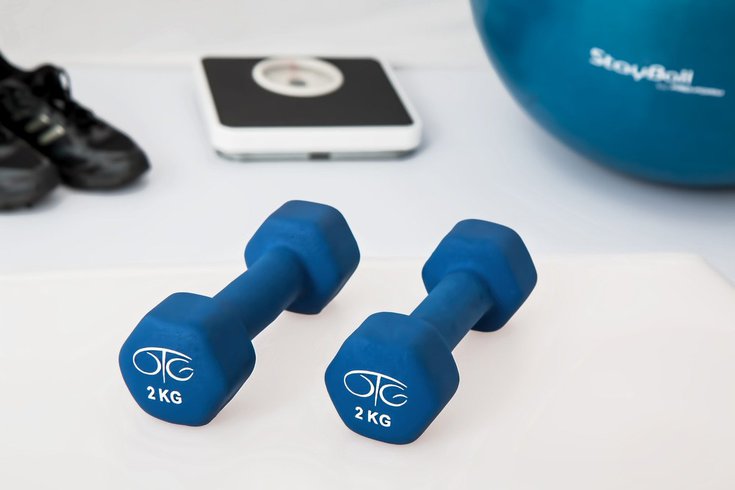
January 03, 2022
 Steve Buissinne/Pixabay
Steve Buissinne/Pixabay
Fitness experts say that when people don't see immediate results when it comes to weight loss they get frustrated and often quit.
At the beginning of a new year, motivation for a healthier and happier lifestyle is usually high. But what about in a month or two when the numbers on the scale aren't budging like expected with a dedicated fitness routine?
Experts say when people don't see immediate results that they get frustrated and often quit, not realizing how much their overall health can benefit from regular exercise even without significant weight loss.
Studies continue to show that being more active throughout the day is good for us – even if we don't continue to shed pounds.
“As we start the new year, try focusing on short-term goals of how you want to feel rather than how you want to look,” Jaspal Singh, M.D., a triple-board certified physician specializing in physical medicine and rehabilitation, sports medicine and pain medicine in New York City, told Forbes. “When we focus on only the outward benefits of exercise rather than the health benefits, these goals fall through.”
Exercise more than weight loss decreases the risk of cardiovascular disease, data shows. No matter your current weight, it decreases unhealthy triglycerides and increases your level of high-density lipoprotein or "good" cholesterol.
It also helps prevent or manage chronic health conditions such as metabolic syndrome, high blood pressure, type 2 diabetes and arthritis.
Research shows that it improves longevity too. A review of studies reported in The New York Times found that even if you are overweight or obese, being fit is more important than dieting and weight loss for lowering the risk of heart disease and premature death.
Have you ever noticed that after a workout or even a simple walk around the neighborhood, you feel happier and less stressed? The Mayo Clinic says this is because physical activity triggers the release of chemicals in the brain that improve how we feel.
More specifically, exercise boosts levels of endorphins – the body's natural painkillers that reduce levels of stress hormones such as adrenaline and cortisol.
Exercise can also reduce symptoms of depression. In one study reported by the Cleveland Clinic, just six weeks of yoga combined with standard treatment reduced depression and anxiety in participants.
In addition, regular physical activity strengthens muscles and builds endurance so you have more energy to tackle everything on your daily to-do list. One study found that 90% of people who completed a regular exercise program reported less fatigue than those who did not exercise.
Sleep studies have shown that making exercise a regular habit can improve not only how much sleep you get each night, but also the quality of it.
It is not just about appearances. While regular exercise may make you feel more confident about your appearance which may lead to more bedroom activity, it has also been shown to improve arousal for women and reduce the likelihood of erectile dysfunction issues for men.
Data has shown that regular exercise can combat the effects of aging on your brain. Scientists say a reduction of brain volume which affects verbal memory, learning and emotions is a natural part of aging, but that regular exercise can help preserve or even increase that volume. One study found that even light exercise can increase total brain volume.
Exercise also boosts blood flow to the brain, which improves the building of the neural pathways between brain cells called neuroplasticity.
Moderate exercise on a regular basis increases bone mass and strength. According to Ask the Scientists, "When muscles are activated during physical activity, they push and pull on the bones they attach to. Tension from working muscles encourages bone cells to multiply and thicken."
It also reduces swelling and stiffness in the joints, which has been associated with the natural aging process. Exercises such as push-ups, lunges, squats, and burpees are particularly good for the bones and joints.
The U.S. Department of Health and Human Services recommends that healthy adults get at least 150 minutes of moderate aerobic activity or 75 minutes of more intense aerobic activity a week. Aerobic activity includes a brisk walk, biking, swimming and dancing.
Strength training for all major muscles groups is also recommended at least two times a week. Rock climbing, weight-lifting and using resistance bands are all effective ways to strengthen your muscles, experts say.
The best way to reap the most benefits from exercise is to keep moving every day.
“It’s so easy to come up with reasons not to work out on any given day, but try not to talk yourself out of it,” Rachel Tavel, a doctor of physical therapy and certified strength and conditioning specialist in New York City, said.
“If you need motivation, take a moment to reflect on how you feel physically and mentally after your next workout," she adds. "Do a ‘before’ and ‘after’ assessment. Capture it in writing. Then, use it as your motivation the next time you’re wavering.”
Remember: Before starting any new exercise program, always talk to your doctor first about any potential health concerns you may have.